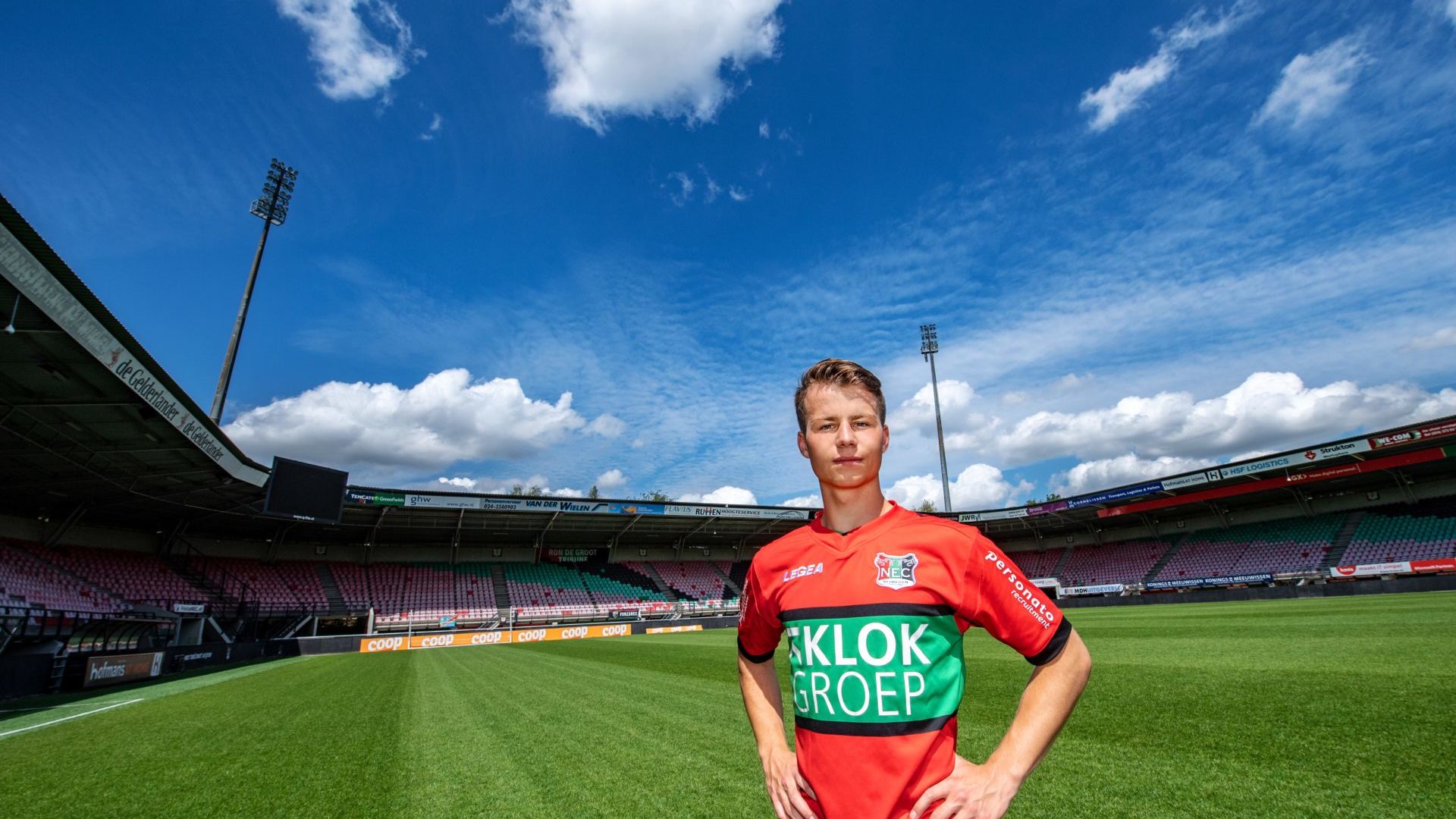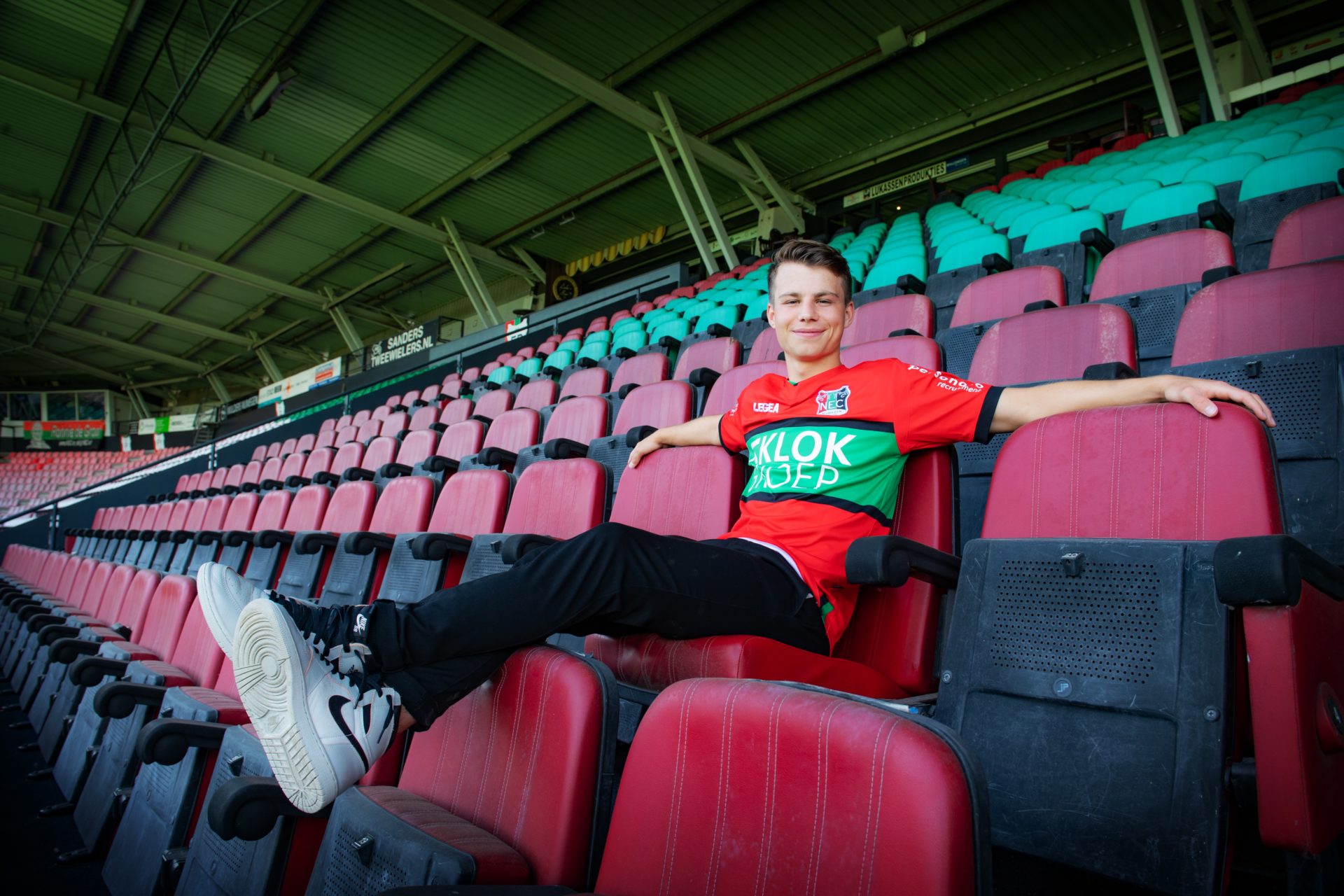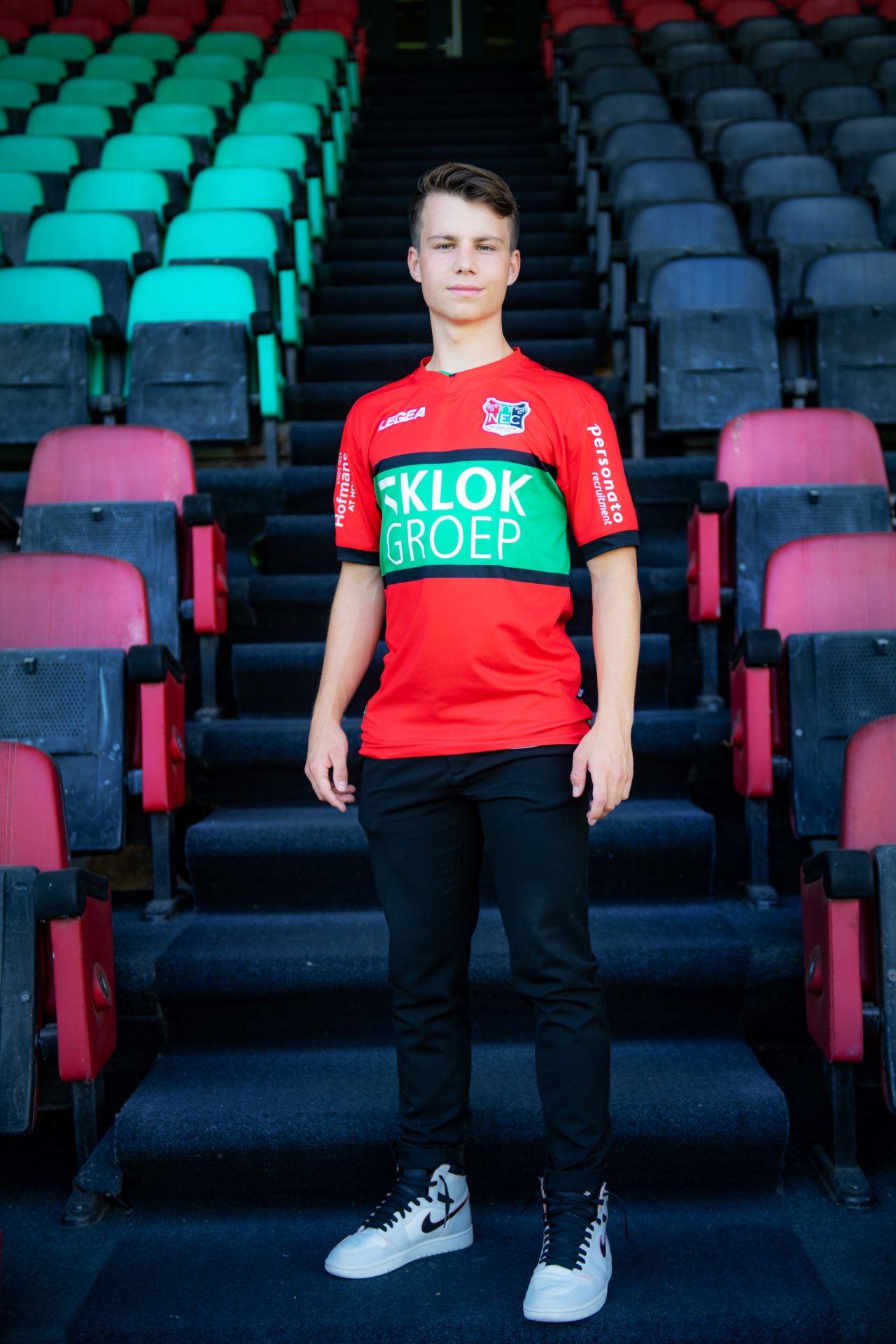Summer interview (4): football talent Dirk Proper moves between Goffert stadium and the university
-
 Dirk Proper. © Bert Beelen
Dirk Proper. © Bert Beelen
Everyone is convinced that Dirk Proper (18) is going to make it as a footballer. And yet the super talent from NEC enrolled at Radboud University last year, to study psychology. ‘I feel at home in both worlds. It's a nice feeling of freedom.’
Talent will out. Dirk Proper made his debut for NEC as a youth player in December. Naturally, it was a shame that they lost the home game against Almere City. But the supporters chanting his name was some compensation at least.
NEC scouted Proper as a nine-year-old at amateur club Spero, in his home town of Elst. He progressed through all the youth teams at the Nijmegen club until, aged seventeen, he suddenly found himself in a packed Goffert stadium. Proper himself finds it a strange idea that he wasn’t really thinking about it at the time. ‘It’s unreal. I’ve been working towards it for so long but at that moment you’re just playing football. As I always do, except that now there are an awful lot of people watching.’
Everyone says you’re the biggest talent the club has.
He smiles modestly: ‘That’s nice to hear.’
When did you realise that you could go professional?
‘I was always among the better players in my age range, so I felt quite confident about it from an early age. I started to get restless around my thirteenth. Before that, as a young kid, it’s mainly just a pipe dream and not yet really serious. But there comes a moment when you feel: this is going well. I’m ahead of a lot of boys my age.’
Was football always a priority?
‘Well, it was the thing I loved doing most. But I never neglected my school work and I completed my university preparatory secondary education. I always enjoyed the variety, and I still do. Training hard in the mornings and working on something completely different after that. A lot of the guys go home and turn on the Playstation but I hit the study books.’ That modesty again: ‘It’s not that I’m particularly clever. I just learn easily.’
Why did you decide to study?
‘As a footballer, you have quite a lot of spare time – the body needs rest too. So it seemed like a good idea to do something else at the same time. You can’t play football up until pension age. Psychology interests me: how does your brain work and why do people display certain behaviour?’
‘My parents always encouraged me to at least complete secondary school and preferably to go on to university. My brother and sister both study at university. I don’t come from a football family and I don’t know who I get the talent from either. Though my brother is a good footballer too. He plays for Spero, so I visit my old club regularly. I still live at home with my parents, so it’s close by.’
And how are you enjoying the study programme? Have you got your BSA?
‘I’ve completed quite a lot of subjects, but I’m just a few credits short for a positive BSA. I skipped certain subjects, with a lot of compulsory seminars, in consultation with study advisor. It’s not a problem that I haven’t got my BSA: due to the corona crisis, all first-year students are allowed to go on to the second year. And even under normal circumstances, I wouldn’t have had to give up the study programme. I get a bit more leeway because of my athlete’s status – the university is flexible that way. As long as it’s possible to combine football and study, I intend to carry on.’
Brazil
In November, Proper’s sights were set not on exams, assignments or lectures. He was travelling to Brazil with the Dutch international under-eighteens. It turned out to be both a high and a low point for the NEC player. ‘It’s great to play in a tournament like that of course. We had won the European Championship earlier that year, so we were the team to beat. We lost in the semi-finals – that hurt.’ And Proper’s personal contribution was also a bit disappointing: he spent most of the time on the bench.
Source of inspiration
When asked who is an example for him, Dirk Proper says it’s the Spanish midfielder Andrés Iniesta, who directed the play at FC Barcelona for years. Like Iniesta, Proper is a play-defining midfielder and at 1.67 metres, a little shorter than the Spanish player. ‘That goal against the Netherlands in the finals of the World Cup hurt, but he’s still a great footballer.’
He hopes to see less of the bench during the coming season at NEC. He signed a new contract with the club, in July, which will keep him in Nijmegen for three years. That signature put an end to rumours that Proper would be moving on soon – both Ajax and PSV are said to be interested in the short midfielder. ‘I want to make more of an impression this coming season.’ For the time being, Proper has played in nine NEC matches. That would have been more if the corona crisis hadn’t prematurely ended the season.
How was the whole corona period for you?
‘It was all very uncertain: when would we be allowed to go back to the club? And in the meantime, I had to stay fit at home. As a team, things were going well and we were still hoping for promotion.’
‘Things were organised well at the university. Some students say they miss the personal contact but that hardly bothered me at all. I attended my lectures online. Even exams could be done from home – perfect for me.’
You now have an agent, a sponsoring contract with Nike and you’re playing for NEC in the first team. What effect does that have on an eighteen-year-old?
‘It gives me confidence and I’m proud of it but I want to stay myself. My parents help me with that – they’re very down to earth. Since this season, we realised I needed an agent. We don’t understand anything about contracts. I have no idea what a normal salary is for an eighteen-year-old who’s just signed with NEC. Having an agent takes the pressure off me and my parents.’
The football world can be tough and crooked, how do you feel about that?
‘It’s true that some aspects of football are not so positive and there are probably a lot of shady deals being done. But if I were working for a company outside football, there would very likely be things there too that I didn’t like so much.
In the end, it’s about the game. As a footballer, you get paid well for doing what you enjoy most. And what people sometimes forget: you learn a lot competing in top sports, things that will be useful the rest of your life, such as dealing with pressure. I also regard football as a stepping stone to a further career.’
Everyone is convinced you’re going to make it in football. According to the general manager of NEC, we’re going to see you play for a top international club. And yet you decided to go to university as well as play football.
‘Naturally, there are moments when it annoys me to have to study for an exam. Or when football clashes with the study programme. During the World Cup, for example, I also had an exam week, which makes you think, shit, how am I going to solve this? You have to make a good plan with your study advisors. It usually ends up with me just taking the resit. And then I have to make sure I’m really well prepared.’

‘The study programme doesn’t get in the way of football. The other way round is sometimes a problem. Such as when I get two weeks notice that I have to go to training camp. Well, I’m not going to cancel that just because I have a compulsory seminar. It’s quite simple: this is my job, it’s what I get paid for.’
The two worlds are totally different, football and the university. Where do you feel more at home?
‘I’m not at the university that often. Once or twice a week. I attend all lectures online. I enjoy the contact with fellow students and get on well with them but if you’re so seldom there, it’s difficult to make friends. I did join in with the orientation week, but I didn’t go the parties in the evenings. I have to be on the football pitch bright and early. And you know, I’m at NEC every day. I’ve been playing football with some of these guys for years. This is my second home.’
How do fellow students respond to the fact that you’re a professional footballer?
‘I don’t think a lot of them even know. I don’t publicise the fact. I’d rather they judge me on my personality.’
And your fellow team-mates, what do they think of the fact that you’re at university?
‘In the Dutch international team, they sometimes call me Jimmy Neutron, jokes like that. I can laugh about that, and I understand it. But other than that, with team-mates it’s always about football, not anything else we do.’
‘The atmosphere in a changing room is completely different to that of a lecture hall. But I feel at home in both worlds. I can move freely from one to the other – it’s only a short bike ride from the Goffert stadium to campus. It’s a nice feeling of freedom.’




